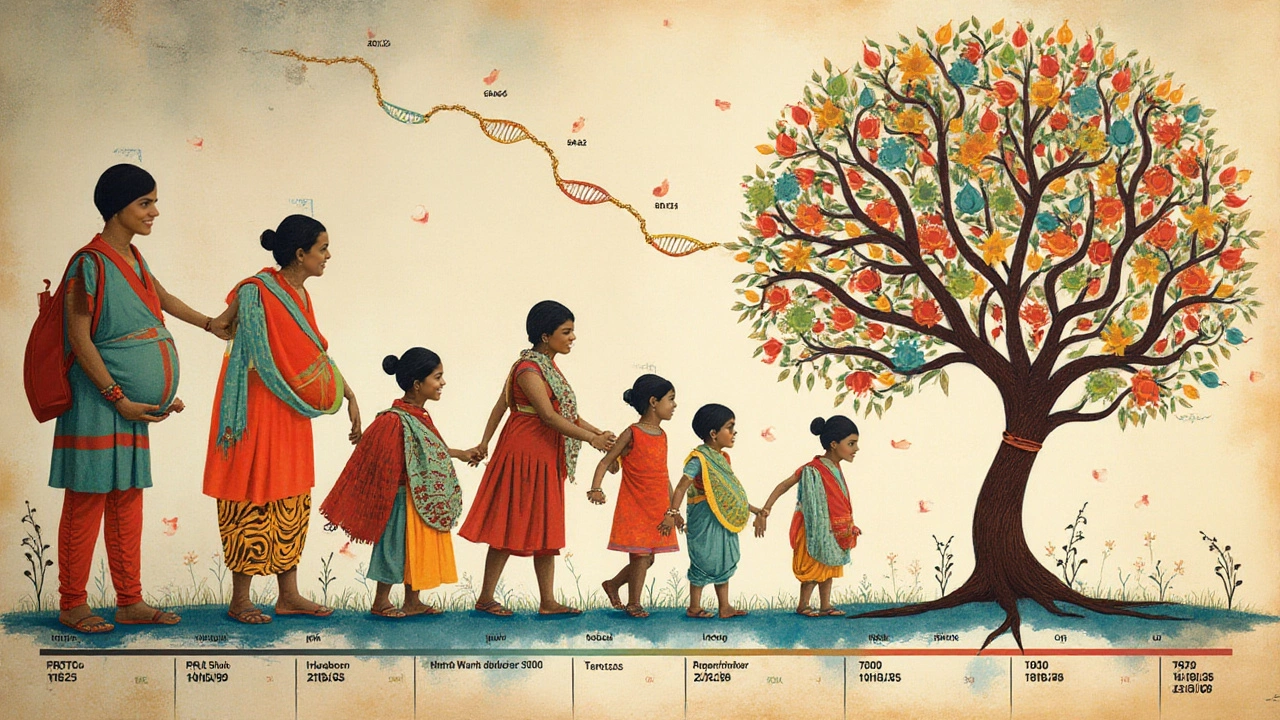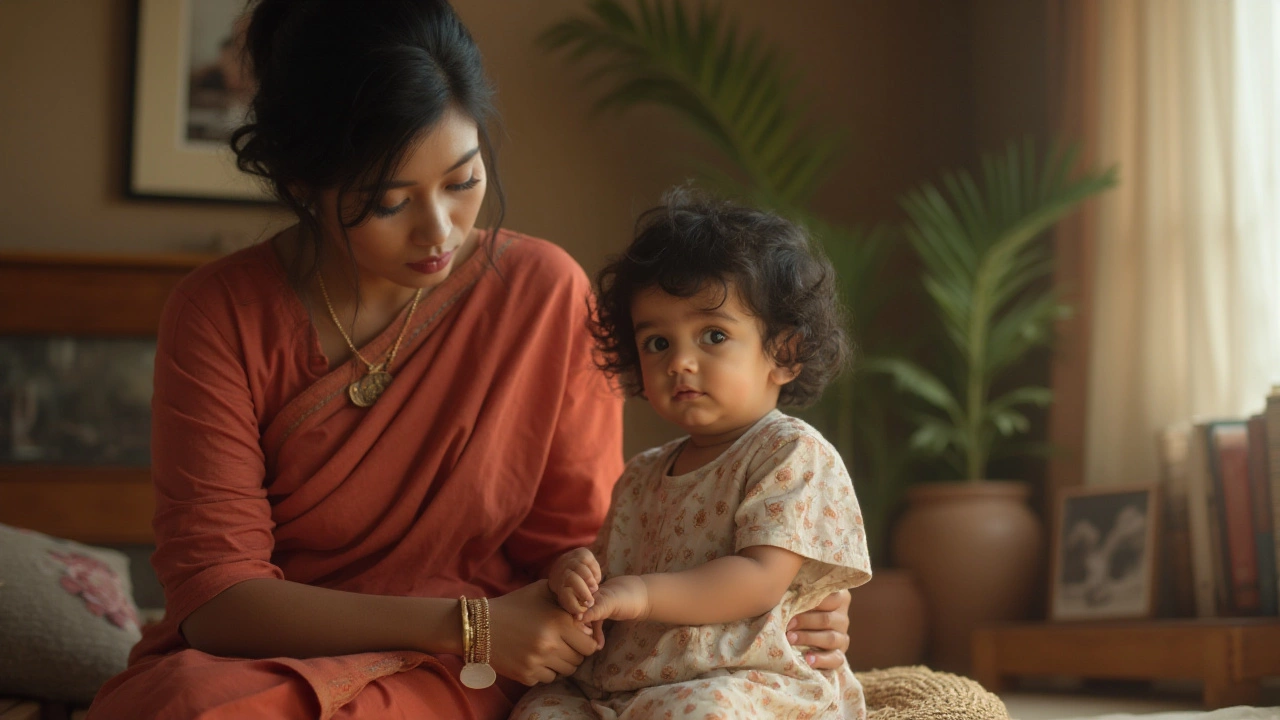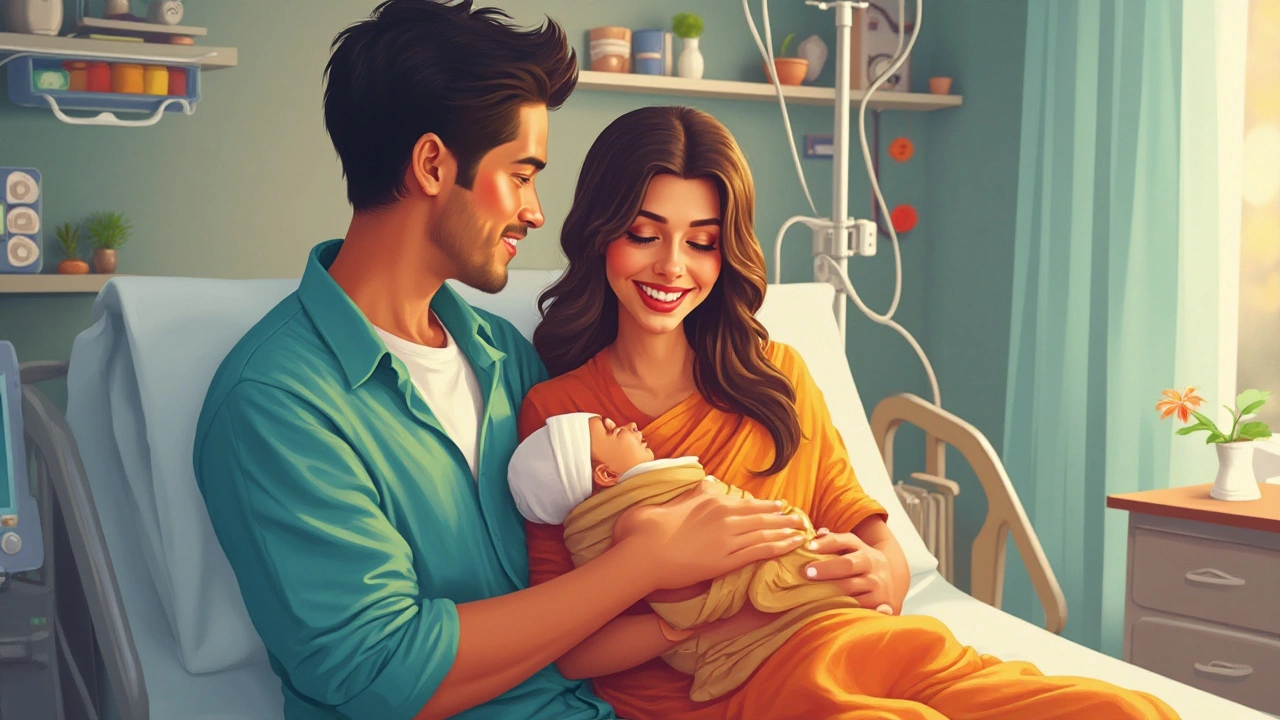The journey of in vitro fertilization (IVF) began in the late 20th century, marking a revolutionary wave in the landscape of reproductive science. As the world's first IVF baby entered the scene in 1978, a new pathway for couples struggling with infertility was paved. Today, the curiosity extends towards the offspring of these IVF-trodden paths—have they ventured into parenthood themselves?
These children of IVF, now well into adulthood, are like a live diary that tells the evolving story of genetic influence and environmental interplay. As they reach the age where starting a family is a consideration, questions about their own fertility emerge. There's a natural curiosity about whether their origins—so distinctly rooted in scientific advancement—impact their ability to conceive naturally or even lead to a similar reliance on assisted reproductive technologies.
Exploring this topic isn't just about understanding the past; it's about looking to the future and what the experiences of these individuals teach us about genetics and fertility. It's a narrative that combines personal stories with scientific inquiry, providing insight into one of the most exciting periods in fertility research. Through looking at the data and hearing the stories, we gain a window into the surprising forces shaping human reproduction today.
A Brief History of IVF
In vitro fertilization (IVF) represents one of the most profound breakthroughs in modern medicine, transforming the landscape of reproductive health starting in the late 20th century. The initially pioneering yet controversial procedure aimed to give hope to couples facing infertility by circumventing natural conception barriers. The groundbreaking moment came in 1978 with the birth of Louise Brown in Oldham, England, the world's first baby born through IVF. Louise’s birth was followed by intense curiosity and scrutiny, catalyzing discussions about medical ethics, scientific progress, and societal implications.
The IVF journey began with the collaborative work of Dr. Robert Edwards, a physiologist, and Dr. Patrick Steptoe, a gynecologist. Their relentless efforts in perfecting the technique of fertilizing an egg outside the human body resulted in years of research challenges and failures. Their dedication paid off when the first successful fertilization and subsequent embryo transfer led to a healthy, full-term birth—a feat that won Dr. Edwards the Nobel Prize in Physiology or Medicine in 2010. The initial successes sparked a surge in both public interest and further scientific investigations, paving the way for an era of rapid advancements in reproductive technology.
The early days of IVF were marked by both optimism and skepticism, but as technology evolved, so did its acceptance. By the mid-1980s, IVF had grown from a medical anomaly to a mainstream treatment option, with clinics worldwide adopting the practice. The promising results led to increased demand and further innovations, such as the development of intracytoplasmic sperm injection (ICSI) in the 1990s, which proved invaluable for treating male infertility. This progress significantly increased the birth rates of healthy IVF-conceived babies globally and reinforced IVF's role in expanding the possibilities of human reproduction.
As IVF technology advanced, so did the ethical and moral debates surrounding it. Concerns were raised about the implications of manipulating human reproduction and the potential for unforeseen genetic consequences. However, countless success stories gradually shifted public perception, and more jurisdictions began to create supportive legal frameworks for IVF treatments. The emerging data and success rates supported the integration of IVF into standard fertility protocols across the globe, thus normalizing what was once considered a radical medical intervention.
"IVF has transformed from a bold experiment to a beacon of hope for millions battling infertility," said Dr. Louise Joy Brown, reflecting on the far-reaching impact of her pioneering birth.
Today, the history of IVF is not just a testament to scientific ingenuity and perseverance but also a human story of resilience and hope. The journey from a singular, successful experiment to a globally embraced medical procedure encapsulates a monumental shift in how humanity approaches reproductive health. This story continues to evolve as researchers and practitioners innovate, striving to make the procedure more effective, affordable, and accessible. In many ways, IVF has democratized the dream of parenthood, allowing individuals and couples, regardless of their genetic or social circumstances, to explore the possibilities of starting a family. As a result, IVF is not just a medical intervention but a catalyst for change, challenging us to continually reconsider and expand our understanding of what is possible within the realm of human fertility.

IVF Babies Growing Up
The first generation of IVF babies, born from the late 1970s onward, has reached adulthood, providing an extraordinary opportunity to study long-term outcomes of this groundbreaking reproductive technology. These individuals, once hailed as medical marvels, now navigate their own lives, careers, and family aspirations, offering unique perspectives on growing up in the shadow of such an innovative birth method. Their lives are testament to resilience and adaptability, proving that unconventional starts can lead to conventional lives, or vice versa.
For many IVF-conceived individuals, childhood was not markedly different from their peers. They attended school, made friends, and participated in typical childhood endeavors. Yet, their origin stories set them apart in subtle ways. Some grew up with a heightened awareness of their beginnings due to the unique medical circumstances surrounding their conception, which was sometimes shared with them by proud parents eager to remind them of their special start in life. There has been an ongoing conversation about the emotional and psychological impacts these early IVF pioneers may experience, but research largely indicates they have adjusted well, with mental health and wellbeing measures paralleling those of non-IVF peers.
The Journey into Adulthood
As they transitioned into adulthood, questions naturally arose about their fertility, mirroring societal pressures that anyone might face when considering family planning. Many of these individuals have now embarked on journeys toward parenthood themselves, leading to extensive research into their fertility outcomes. Initial studies suggest that the fertility of IVF-conceived adults is comparable to that of the general population. A critical factor that has emerged is the genetic components of infertility issues; for those whose parents originally had genetic challenges, there can be a likelihood of inheriting similar challenges, albeit this does not directly relate to their IVF beginnings.
"The fertility of IVF-conceived individuals appears to be largely similar to those conceived naturally," notes Dr. Louise Brown, a leading researcher in reproductive health.The insights shared by experts help demystify the preconceived notions that being an IVF baby might inherently affect fertility. Science and society continue to observe this group closely, collecting data that contributes to understanding larger patterns of reproductive health.
A fascinating aspect of these adults' lives is how they contribute to ongoing discussions about IVF ethics and advancements. Some have become advocates within fertility circles, offering their voices to the narrative surrounding assisted reproductive technologies. Their experiences nourish the dialogue, providing valuable firsthand insight, which, in turn, informs policy and societal outlooks. Notably, HBO's documentary, "Test Tube Families," follows several IVF kids now grown up, capturing their experiences and aspirations as they navigate adulthood.
Contributions to Broader Understanding
The stories of IVF babies growing up, many of which are only beginning to unfold, are filled with groundbreaking insights applicable far beyond the sphere of reproductive technology. They challenge perceptions about what it means to be born through medical intervention, shifting focus from merely technological considerations to personal impacts and societal integration. As the first stars of the IVF revolution continue to mature, they illuminate shared narratives about fertility, identity, and the profound ways human experiences are shaped by science. The ongoing interest in their fertility journeys symbolizes a collective desire to understand how early medical interventions shape not just individuals, but generations.

Fertility and Genetics
The intriguing intersection of fertility and genetics becomes profoundly relevant when discussing children born through IVF technology. Early studies offer a glimpse into whether genetic predispositions influence the future reproductive capabilities of these individuals. While the science of genetics provides fundamental insights into hereditable traits, it's a field that still holds many secrets, especially in how it relates to IVF babies growing into their reproductive years. The inherited genetic makeup undoubtedly plays a role, yet understanding how this translates into actual fertility can be complex.
One might look at genetic predispositions toward fertility as a kind of biological inheritance, just as eye color or height. Researchers seek to determine whether an IVF conception impacts an individual's fertility, independent of the parents' reasons for undergoing IVF initially. While IVF has helped countless families achieve their dream of raising children, the next step involves understanding the genetic narrative and how these advances impact the offspring's ability to conceive. This focus on genetics and fertility is about establishing a continuum from the help offered to parents to the potential need for assistance by their children when starting their own families.
Some recent studies indicate that there might not be a significant difference in the fertility rates of those born via IVF compared to those naturally conceived. Yet, given that the first IVF generation is only now entering the stage of potential parenthood, comprehensive data is still emerging. This realm of study is crucial not only for helping individuals born through IVF but also for refining the IVF treatment process itself. Understanding the long-term implications helps guide ethical considerations and shapes future innovations in reproductive health.
The Role of Genetic Counseling
Genetic counseling is becoming an increasingly important tool for families considering IVF. With newer genetic screening technologies, potential parents can gain insights into their own genetic compatibility and learn about any risks the child might face. This approach doesn't just seek to avoid hereditary conditions but also assists in understanding the couple's genetic roadmap. Despite some underlying concerns, knowing more about genetics doesn't necessarily complicate the decision-making process for these families but enhances it by providing a fuller picture of what lies ahead. Researchers emphasize that while genetics offers vital clues, it should not overshadow the broader aspects of human reproduction, which includes lifestyle and environmental factors.
"The question whether IVF itself influences the fertility of the next generation is not purely scientific but deeply human in ensuring that every subsequent life is born with the best understanding." - Dr. Louise Brown, IVF Expert.
As research continues to unfold, the holistic view provided by studies combining genetics, environmental factors, and personal health histories will undoubtedly offer deeper insights. Scientists are optimistic that these findings will foster improvements that can guard against or lessen the genetic burden carried forward. This will not only aid future generations of IVF offspring but also enhance our general comprehension of congenital genetic tendencies—leading to more personalized approaches in IVF treatment and reproductive health.

The Future of IVF Generations
As the first generation of IVF babies step into the realm of parenthood themselves, the potential ripples they create in the pool of human reproduction stir both fascination and inquiry. Having witnessed their arrival as milestones of science, the world now holds a collective breath to see how their own reproductive journeys unfold. Are these individuals more likely to experience relatively normal paths to parenthood, or do they carry the threads of assisted reproduction into the future? While each journey is unique, encompassing personal choices and circumstances, data collected from various studies helps shed light on common trends.
According to research, these IVF-conceived adults generally display reproductive health similar to their naturally conceived peers. However, this doesn't eliminate the curiosities surrounding any potential subtle differences that might arise as they grow older and embark on family-building endeavors. Some early research hints at the idea that children conceived through assisted reproductive technologies (ART) have slightly higher incidences of health issues, yet these studies often call for more expansive research to validate such claims. As this generation ages, insights gathered from their reproductive experiences will help refine IVF and other ART methods, ensuring they continue to evolve and improve.
The focus on the future isn't strictly scientific; it's also about the cultural and societal reflections on what it means to be an ART-conceived individual in modern society. Some IVF adults advocate openly for the continued destigmatization of fertility treatments, lending their voices to discussions and policy-making processes. They inspire a new dynamism in how fertility and birth are perceived, strongly emphasizing acceptance and understanding. This societal shift opens doors to holistic approaches not just in treatment but also in support systems for individuals and couples facing reproductive challenges.
Scientific Innovation and Technology
Back on the scientific front, technological advancements don't rest. From genetic screenings to ensure healthier embryos to innovations like CRISPR aimed at gene editing, the future looks bright for a more precise and personalized approach to IVF. One aim is to reduce the incidence of conditions that historically lead to infertility, thus minimizing the need for interventions.
"The evolution of assisted reproductive technologies is not just about increasing success rates but understanding deeper biological connections," notes Dr. Mary L. Spofford, a leading figure in reproductive medicine research.Such insights could change how early treatments are administered, benefiting both present and future generations.
These technological strides are complemented by an increasing emphasis on ethical considerations, sustainability, and accessibility. The democratization of IVF services, along with transparency in processes and outcomes, is pivotal. Ensuring these treatments are available to a broader range of socioeconomic backgrounds allows for a more inclusive growth in the field. As regulations adapt to these needs, the future promises a balanced relationship between innovation and ethics, crafting a comprehensive future roadmap for IVF generations.





